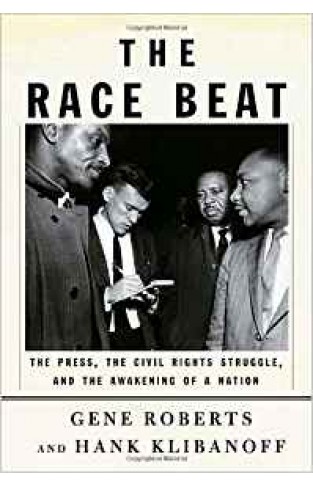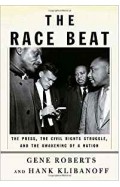- Home
- Books
- Sale
- Book Bazaar RP Up To 60% Off
- RP - Current Affairs
- The Race Beat: The Press, the Civil Rights Struggle, and the Awakening of a Nation
The Race Beat: The Press, the Civil Rights Struggle, and the Awakening of a Nation
By: Gene Roberts and Hank Klibanoff
-
Rs 795.00
Due to constant currency fluctuation, prices are subject to change with or without notice.
We're Offering A High Discount On This Book As It Is Slightly Damaged
This is the story of how America awakened to its race problem, of how a nation that longed for unity after World War II came instead to see, hear, and learn about the shocking indignities and injustices of racial segregation in the South—and the brutality used to enforce it.
It is the story of how the nation’s press, after decades of ignoring the problem, came to recognize the importance of the civil rights struggle and turn it into the most significant domestic news event of the twentieth century.
Drawing on private correspondence, notes from secret meetings, unpublished articles, and interviews, veteran journalists Gene Roberts and Hank Klibanoff go behind the headlines and datelines to show how a dedicated cadre of newsmen—first black reporters, then liberal southern editors, then reporters and photographers from the national press and the broadcast media—revealed to a nation its most shameful shortcomings and propelled its citizens to act.
We watch the black press move bravely into the front row of the confrontation, only to be attacked and kept away from the action. Following the Supreme Court’s 1954 decision striking down school segregation and the South’s mobilization against it, we see a growing number of white reporters venture South to cover the Emmett Till murder trial, the Montgomery bus boycott, and the integration of the University of Alabama.
We witness some southern editors joining the call for massive resistance and working with segregationist organizations to thwart compliance. But we also see a handful of other southern editors write forcefully and daringly for obedience to federal mandates, signaling to the nation that moderate forces were prepared to push the region into the mainstream.
The pace quickens in Little Rock, where reporters test the boundaries of journalistic integrity, then gain momentum as they cover shuttered schools in Virginia, sit-ins in North Carolina, mob-led riots in Mississippi, Freedom Ride buses being set afire, fire hoses and dogs in Birmingham, and long, tense marches through the rural South.
For many journalists, the conditions they found, the fear they felt, and the violence they saw were transforming. Their growing disgust matched the mounting countrywide outrage as The New York Times, Newsweek, NBC News, and other major news organizations, many of them headed by southerners, turned a regional story into a national drama.
Meticulously researched and vividly rendered, The Race Beat is an unprecedented account of one of the most volatile periods in our nation’s history, as told by those who covered it.
We're Offering A High Discount On This Book As It Is Slightly Damaged
This is the story of how America awakened to its race problem, of how a nation that longed for unity after World War II came instead to see, hear, and learn about the shocking indignities and injustices of racial segregation in the South—and the brutality used to enforce it.
It is the story of how the nation’s press, after decades of ignoring the problem, came to recognize the importance of the civil rights struggle and turn it into the most significant domestic news event of the twentieth century.
Drawing on private correspondence, notes from secret meetings, unpublished articles, and interviews, veteran journalists Gene Roberts and Hank Klibanoff go behind the headlines and datelines to show how a dedicated cadre of newsmen—first black reporters, then liberal southern editors, then reporters and photographers from the national press and the broadcast media—revealed to a nation its most shameful shortcomings and propelled its citizens to act.
We watch the black press move bravely into the front row of the confrontation, only to be attacked and kept away from the action. Following the Supreme Court’s 1954 decision striking down school segregation and the South’s mobilization against it, we see a growing number of white reporters venture South to cover the Emmett Till murder trial, the Montgomery bus boycott, and the integration of the University of Alabama.
We witness some southern editors joining the call for massive resistance and working with segregationist organizations to thwart compliance. But we also see a handful of other southern editors write forcefully and daringly for obedience to federal mandates, signaling to the nation that moderate forces were prepared to push the region into the mainstream.
The pace quickens in Little Rock, where reporters test the boundaries of journalistic integrity, then gain momentum as they cover shuttered schools in Virginia, sit-ins in North Carolina, mob-led riots in Mississippi, Freedom Ride buses being set afire, fire hoses and dogs in Birmingham, and long, tense marches through the rural South.
For many journalists, the conditions they found, the fear they felt, and the violence they saw were transforming. Their growing disgust matched the mounting countrywide outrage as The New York Times, Newsweek, NBC News, and other major news organizations, many of them headed by southerners, turned a regional story into a national drama.
Meticulously researched and vividly rendered, The Race Beat is an unprecedented account of one of the most volatile periods in our nation’s history, as told by those who covered it.
Zubin Mehta: A Musical Journey (An Authorized Biography)
By: VOID - Bakhtiar K. Dadabhoy
Rs 840.00 Rs 1,050.00 Ex Tax :Rs 840.00
Myths Illusions and Peace: Finding a New Direction for America in the Middle East
By: Dennis Ross
Rs 1,095.00 Ex Tax :Rs 1,095.00
Operation Dark Heart: Spycraft And Special Ops On The Frontlines Of Afghanistan And The Path To Victory
By: Anthony Shaffer
Rs 1,800.00 Rs 2,250.00 Ex Tax :Rs 1,800.00
Anna Hazare: The Face Of Indias Fight Against Corruption
By: Pradeep Thakur
Rs 300.00 Ex Tax :Rs 300.00
How To Win A Cosmic War God Globalization And The End Of War
By: Reza Aslan
Rs 695.00 Ex Tax :Rs 695.00
A Long Time Comming: The Inspiring Combative 2008 Campaign And
By: Evan Thomas
Rs 795.00 Ex Tax :Rs 795.00
No recently viewed books available at the moment.
Zubin Mehta: A Musical Journey (An Authorized Biography)
By: VOID - Bakhtiar K. Dadabhoy
Rs 840.00 Rs 1,050.00 Ex Tax :Rs 840.00














-120x187.jpg?q6)





-120x187.jpg?q6)
-120x187.jpg?q6)









